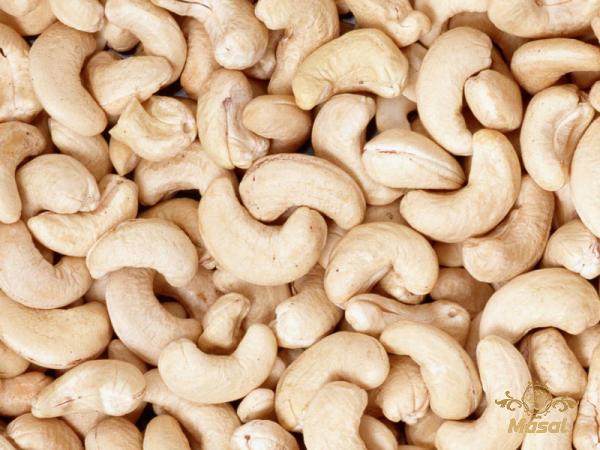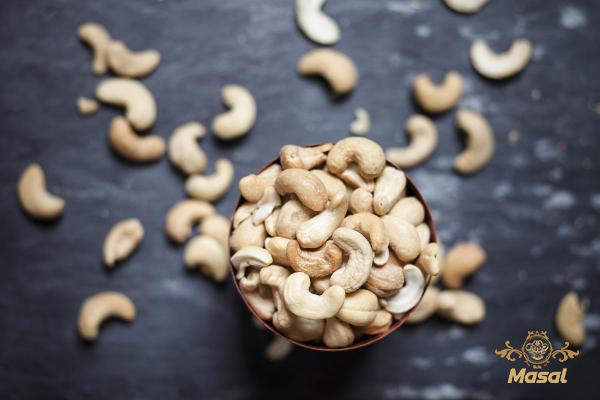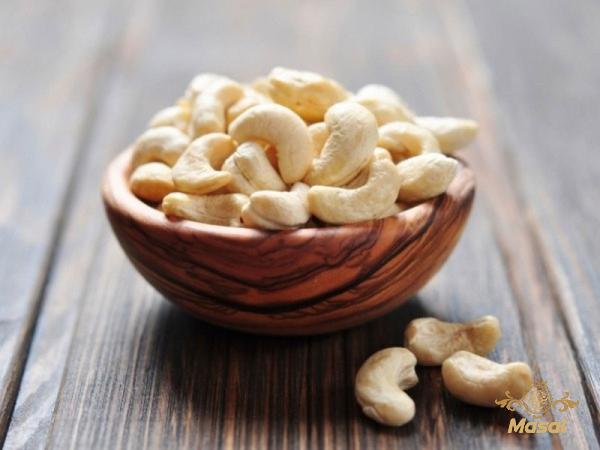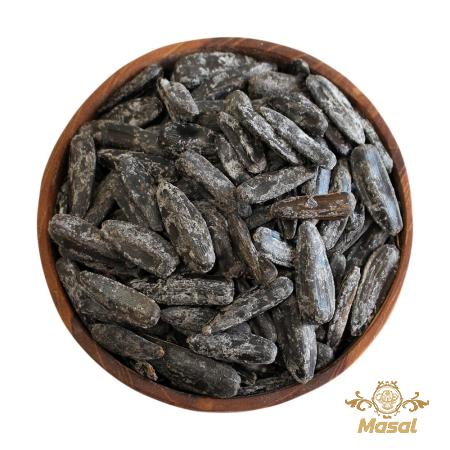India is the world’s largest producer, consumer, and exporter of cashews. The country’s cashew industry has witnessed remarkable growth in recent years due to various factors, including favorable climate conditions, increasing domestic consumption, and a focus on quality production. This summary aims to provide an overview of the cashew market in India, including its production, consumption, export potential, challenges, and future prospects. Production: India boasts a significant cashew cultivation base, primarily concentrated in the western and southern parts of the country. Key cashew-producing states include Maharashtra, Karnataka, Kerala, Andhra Pradesh, and Goa. The country’s favorable tropical climate and ample availability of arable land make it an ideal location for cashew cultivation. The production process involves several stages, including planting, harvesting, and processing of cashew nuts. India’s cashew annual production has consistently increased over the years, with current estimates reaching around 800,000 metric tons. The Indian government has been actively promoting cashew cultivation through various incentives and programs, such as providing subsidies and technical assistance to farmers. Additionally, the use of advanced agricultural practices, including the adoption of high-yielding varieties and improved processing technologies, has further contributed to increased cashew production. Consumption: India is not only a major cashew producer but also a substantial consumer of cashew nuts. Cashews are primarily consumed as a snack food and a popular ingredient in Indian cuisine. The growing middle-class population, rising disposable incomes, and changing dietary preferences have fueled the increase in domestic cashew consumption. Cashews are widely consumed as a standalone snack, used in confectionary products, and incorporated into various dishes, including sweets, curries, and desserts. Export Potential: India’s cashew export market is thriving due to its competitive advantage in terms of quality, cost-effectiveness, and availability. Cashew exports from India primarily cater to countries in Europe, the United States, the Middle East, and Southeast Asia. The demand for Indian cashews in the international market is driven by their superior taste, consistent quality, and stringent adherence to food safety standards. India’s proactive approach to maintaining high-quality standards has helped it establish a strong reputation as a reliable supplier of cashews. The country has also invested in the modernization of cashew processing facilities and implementing advanced production techniques to ensure the availability of premium-grade products for export. The annual export of processed cashews from India currently stands at around 200,000 metric tons.

nut
 India’s cashew market has experienced remarkable growth in recent years, positioning the country as a global leader in cashew production, consumption, and export. This article explores the various business opportunities within the cashew industry, highlighting key areas such as cashew processing, value addition, technology adoption, and market diversification. By leveraging these opportunities, businesses can capitalize on India’s thriving cashew market and maximize profitability. 1. Cashew Processing: Enhancing Efficiency and Quality Cashew processing plays a critical role in the industry value chain. Investing in modern processing facilities and adopting advanced technology can significantly improve production efficiency and product quality. Automated machineries for roasting, shelling, and grading can streamline operations, reduce labor costs, and enhance output consistency. Businesses should also focus on maintaining stringent quality control measures to meet both domestic and international standards, further enhancing their market competitiveness. 2. Value Addition: Expanding Product Portfolio Diversifying the product portfolio by incorporating value-added cashew products can open new business opportunities within the cashew industry. Cashew-based snacks, chocolates, and beverages are gaining popularity among consumers, offering businesses the chance to tap into the growing demand for healthy and nutritious food options. Developing innovative cashew-based products, leveraging unique flavors, and exploring niche market segments can provide a competitive edge and drive business growth. 3. Export Market Development: Tapping Global Demand India’s cashew export potential is vast, with opportunities to tap into new market segments. Businesses should conduct market research to identify unexplored regions and tailor their products based on consumer preferences and cultural nuances. Collaborations with overseas distributors and strategic partnerships can facilitate market entry, ensuring a reliable supply chain and efficient distribution network. Additionally, leveraging e-commerce platforms and digital marketing strategies can expand market reach and boost international sales.
India’s cashew market has experienced remarkable growth in recent years, positioning the country as a global leader in cashew production, consumption, and export. This article explores the various business opportunities within the cashew industry, highlighting key areas such as cashew processing, value addition, technology adoption, and market diversification. By leveraging these opportunities, businesses can capitalize on India’s thriving cashew market and maximize profitability. 1. Cashew Processing: Enhancing Efficiency and Quality Cashew processing plays a critical role in the industry value chain. Investing in modern processing facilities and adopting advanced technology can significantly improve production efficiency and product quality. Automated machineries for roasting, shelling, and grading can streamline operations, reduce labor costs, and enhance output consistency. Businesses should also focus on maintaining stringent quality control measures to meet both domestic and international standards, further enhancing their market competitiveness. 2. Value Addition: Expanding Product Portfolio Diversifying the product portfolio by incorporating value-added cashew products can open new business opportunities within the cashew industry. Cashew-based snacks, chocolates, and beverages are gaining popularity among consumers, offering businesses the chance to tap into the growing demand for healthy and nutritious food options. Developing innovative cashew-based products, leveraging unique flavors, and exploring niche market segments can provide a competitive edge and drive business growth. 3. Export Market Development: Tapping Global Demand India’s cashew export potential is vast, with opportunities to tap into new market segments. Businesses should conduct market research to identify unexplored regions and tailor their products based on consumer preferences and cultural nuances. Collaborations with overseas distributors and strategic partnerships can facilitate market entry, ensuring a reliable supply chain and efficient distribution network. Additionally, leveraging e-commerce platforms and digital marketing strategies can expand market reach and boost international sales.
Specifications of nut
 4. Organic Cashews: Capturing the Health-Conscious Market The global demand for organic cashews is on the rise, presenting a lucrative business opportunity for Indian cashew growers and processors. Investing in organic certification processes and sustainable farming practices can help businesses cater to health-conscious consumers seeking chemical-free and environmentally friendly products. Promoting transparency in the supply chain, emphasizing fair trade practices, and adhering to stringent organic standards can further enhance market competitiveness and appeal to conscious consumers. 5. Government Support and Incentives: Availing Business Benefits The Indian government has been proactive in providing support and incentives to promote the cashew industry. Businesses can leverage schemes such as subsidies on machinery, financial assistance for setting up processing units, and assistance in accessing domestic and international markets. Availing these government initiatives can help businesses reduce capital expenditure, improve cash flow, and ensure a competitive advantage. 6. Research and Development: Driving Innovation Investing in research and development (R&D) facilitates innovation and technology adoption within the cashew industry. Collaborating with agricultural research institutions and universities can lead to the development of disease-resistant cashew varieties, improved cultivation practices, and innovative processing methods. R&D efforts can also focus on waste management and by-product utilization, contributing to environmental sustainability while generating additional revenue streams for businesses. 7. Supply Chain Management: Ensuring Timely Delivery Efficient and streamlined supply chain management is critical for businesses operating in the cashew industry. Developing strong relationships with cashew farmers, ensuring a consistent supply of raw cashew nuts, and establishing reliable transportation networks are essential for timely production and delivery. Adopting modern inventory management systems, optimizing logistics, and implementing quality control measures throughout the supply chain can improve customer satisfaction and enhance business profitability.
4. Organic Cashews: Capturing the Health-Conscious Market The global demand for organic cashews is on the rise, presenting a lucrative business opportunity for Indian cashew growers and processors. Investing in organic certification processes and sustainable farming practices can help businesses cater to health-conscious consumers seeking chemical-free and environmentally friendly products. Promoting transparency in the supply chain, emphasizing fair trade practices, and adhering to stringent organic standards can further enhance market competitiveness and appeal to conscious consumers. 5. Government Support and Incentives: Availing Business Benefits The Indian government has been proactive in providing support and incentives to promote the cashew industry. Businesses can leverage schemes such as subsidies on machinery, financial assistance for setting up processing units, and assistance in accessing domestic and international markets. Availing these government initiatives can help businesses reduce capital expenditure, improve cash flow, and ensure a competitive advantage. 6. Research and Development: Driving Innovation Investing in research and development (R&D) facilitates innovation and technology adoption within the cashew industry. Collaborating with agricultural research institutions and universities can lead to the development of disease-resistant cashew varieties, improved cultivation practices, and innovative processing methods. R&D efforts can also focus on waste management and by-product utilization, contributing to environmental sustainability while generating additional revenue streams for businesses. 7. Supply Chain Management: Ensuring Timely Delivery Efficient and streamlined supply chain management is critical for businesses operating in the cashew industry. Developing strong relationships with cashew farmers, ensuring a consistent supply of raw cashew nuts, and establishing reliable transportation networks are essential for timely production and delivery. Adopting modern inventory management systems, optimizing logistics, and implementing quality control measures throughout the supply chain can improve customer satisfaction and enhance business profitability.
buy nut
 8. Branding and Marketing: Creating a Strong Market Presence Establishing a strong brand presence is crucial for businesses operating in a competitive cashew market. Building a brand reputation for quality, consistency, and reliability can attract domestic and international customers. Adopting marketing strategies that highlight the unique characteristics of Indian cashews, such as their taste, texture, and nutritional value, can differentiate businesses from competitors. Social media campaigns, participation in trade shows, and collaborations with influencers can further enhance brand visibility and consumer engagement. 9. Collaboration with Farmers: Ensuring a Sustainable Supply Collaboration with cashew farmers is essential for businesses to secure a sustainable supply of raw cashew nuts. Engaging in fair trade practices, providing technical assistance, and offering capacity-building initiatives can create a mutually beneficial relationship. By empowering farmers with knowledge and resources, businesses can ensure a consistent supply of high-quality raw materials while fostering long-term partnerships. 10. Financial Management: Ensuring Profitability Effective financial management is crucial for the long-term sustainability of cashew businesses. Adopting robust accounting systems, monitoring costs, and analyzing profitability at various stages of the value chain can help businesses make informed decisions. Exploring financial tools, such as credit facilities and insurance, can mitigate risks associated with price fluctuations and market uncertainties, ensuring financial stability for businesses. Conclusion: The cashew market in India offers a plethora of business opportunities for entrepreneurs and industry players. By focusing on cashew processing efficiency, value addition, market diversification, and technology adoption, businesses can leverage India’s growing cashew market to enhance profitability and establish a strong market presence. Collaborating with farmers, embracing sustainability, and capitalizing on government support can further propel the industry forward. With the right strategies and a customer-centric approach, businesses can thrive in India’s expanding cashew market and capitalize on the immense potential it offers.
8. Branding and Marketing: Creating a Strong Market Presence Establishing a strong brand presence is crucial for businesses operating in a competitive cashew market. Building a brand reputation for quality, consistency, and reliability can attract domestic and international customers. Adopting marketing strategies that highlight the unique characteristics of Indian cashews, such as their taste, texture, and nutritional value, can differentiate businesses from competitors. Social media campaigns, participation in trade shows, and collaborations with influencers can further enhance brand visibility and consumer engagement. 9. Collaboration with Farmers: Ensuring a Sustainable Supply Collaboration with cashew farmers is essential for businesses to secure a sustainable supply of raw cashew nuts. Engaging in fair trade practices, providing technical assistance, and offering capacity-building initiatives can create a mutually beneficial relationship. By empowering farmers with knowledge and resources, businesses can ensure a consistent supply of high-quality raw materials while fostering long-term partnerships. 10. Financial Management: Ensuring Profitability Effective financial management is crucial for the long-term sustainability of cashew businesses. Adopting robust accounting systems, monitoring costs, and analyzing profitability at various stages of the value chain can help businesses make informed decisions. Exploring financial tools, such as credit facilities and insurance, can mitigate risks associated with price fluctuations and market uncertainties, ensuring financial stability for businesses. Conclusion: The cashew market in India offers a plethora of business opportunities for entrepreneurs and industry players. By focusing on cashew processing efficiency, value addition, market diversification, and technology adoption, businesses can leverage India’s growing cashew market to enhance profitability and establish a strong market presence. Collaborating with farmers, embracing sustainability, and capitalizing on government support can further propel the industry forward. With the right strategies and a customer-centric approach, businesses can thrive in India’s expanding cashew market and capitalize on the immense potential it offers.










Your comment submitted.